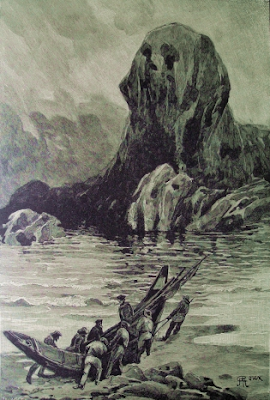Codex Antarctica, you say? If there's one region I like, it's the polar region. Something about the vast wastes of ice and snow (with the odd penguin here and there) strikes deep into my Anglo-Saxon soul. Perhaps it's because Antarctica so anomalous in so many ways. A continent that once flourished, rich with life, but is now locked within mile-deep layers of compacted snow. I am not alone of course, and some of the big names in horror and sci-fi are referenced in this, the poet's nineteenth (sort of) in the Codex sequence.
If you don't know the Cardinal's work, it's well worth seeking out just for the arcane knowledge on offer. Here we have a pamphlet of nine poems (most of them sonnets, interestingly) that cover some of the weirdest fictions and strangest facts or factoids about the great southern continent.
He begins with 'Terra Australis Incognita' and all those old-time cartographers who bunged a big landmass in the southern hemisphere to sort of balance out all the well-documented ones in the northern. 'Those ancient lands about the southern pole/Where there are rumours of a yawning hole.' Coleridge's Ancient Mariner is invoked, the first of many memorable characters.
'The Wreck of the Jane Guy, January 1828' takes us to that other Romantic poet and general weirdo, Edgar Allan Poe, whose character Arthur Gordon Pym had strange encounters in the Southern Arctic. The black, volcanic lands found by Pym and another venturer, Dirk Peters, contrast with the pristine whiteness of the icy landscape. It's a monochrome world down there, and that big hole - as Poe described in another story - is 'where hope goes to die'.
Jules Verne's follow up to 'Pym' (he considered Poe's story incomplete) comes next. Needless to say things went wrong for Verne's follow-up crew as they headed south to discover a rather improbable sphinx - 'our eulogies will be the seabirds' bark'. A bit later, Cox observes, Captain Nemo rather cleverly planted his black flag (monochrome again) at the South Pole using a little-known sub-glacial passage for the Nautilus.
With 'The Old Ones' we get to the heart of the matter, or rather it's protoplasm. Lovecraft's classic polar adventure that introduced the hapless explorers to the shoggoths (and some very big penguins) is the pivotal text here. The Old Ones are portrayed a bit hapless, too, as they 'scuttle nervously beneath the Earth'.
The next poem, 'Between Hydra and Argo Navis', refers to a text I don't know, concerning a vast space habitat. Then, perhaps inevitably, we move on to the Nazis with 'Neuschwahenland'. The Ahnenerbe, Himmler's crank outfit devoted to fabricating some Atlantean origin for the master race, were involved in the German Antarctic Expedition of 1938. No detailed findings seem to exist from that foray, though one might wish that the shoggoths had got them all.
'Operation Highjump' looks at that other, more distinguished explorer, Admiral Byrd, around whose flights so many fringe notions have crystallized. Why bother with the South Pole, Cox asks, when in 1938 the enemy was elsewhere? 'What is the strategy? What do they know?' Well, if they'd gone through Miskatonic University's files they might well have been a tad alarmed.
'Krynoids'! Fans of the Tom Baker era know that Doctor Who went very polar with a tale of mysterious seed pods that had some nasty tendencies. 'Upon man falls vegetative vengeance', the poet solemnly intones, before explaining that the 'Seeds of Death' as depicted by the BBC were in fact a bioweapons devised by the Old Ones and sort of left lying around.
'Outpost No. 31' brings us back to the greatest of icy themes, the isolated polar base. This is the world of Carpenter's Thing, and the possibility that it did indeed escape back in 1982. While the idea that the Thing was a shoggoth seems to fly in the face of evidence - i.e. the spaceship - the central point is well made. 'Would you ever know if you were not you'. Perhaps, in fact, the shape-shifting blobuloids have been emerging from that white blankness and infiltrating out world for a long, long time.
If you'd like a copy of this through-provoking pamphlet you can send an SAE to:
58 Pennington
Orton Goldhay
Peterborough PE2 5RB
Or email cardinalcox1@yahoo.co.uk





No comments:
Post a Comment